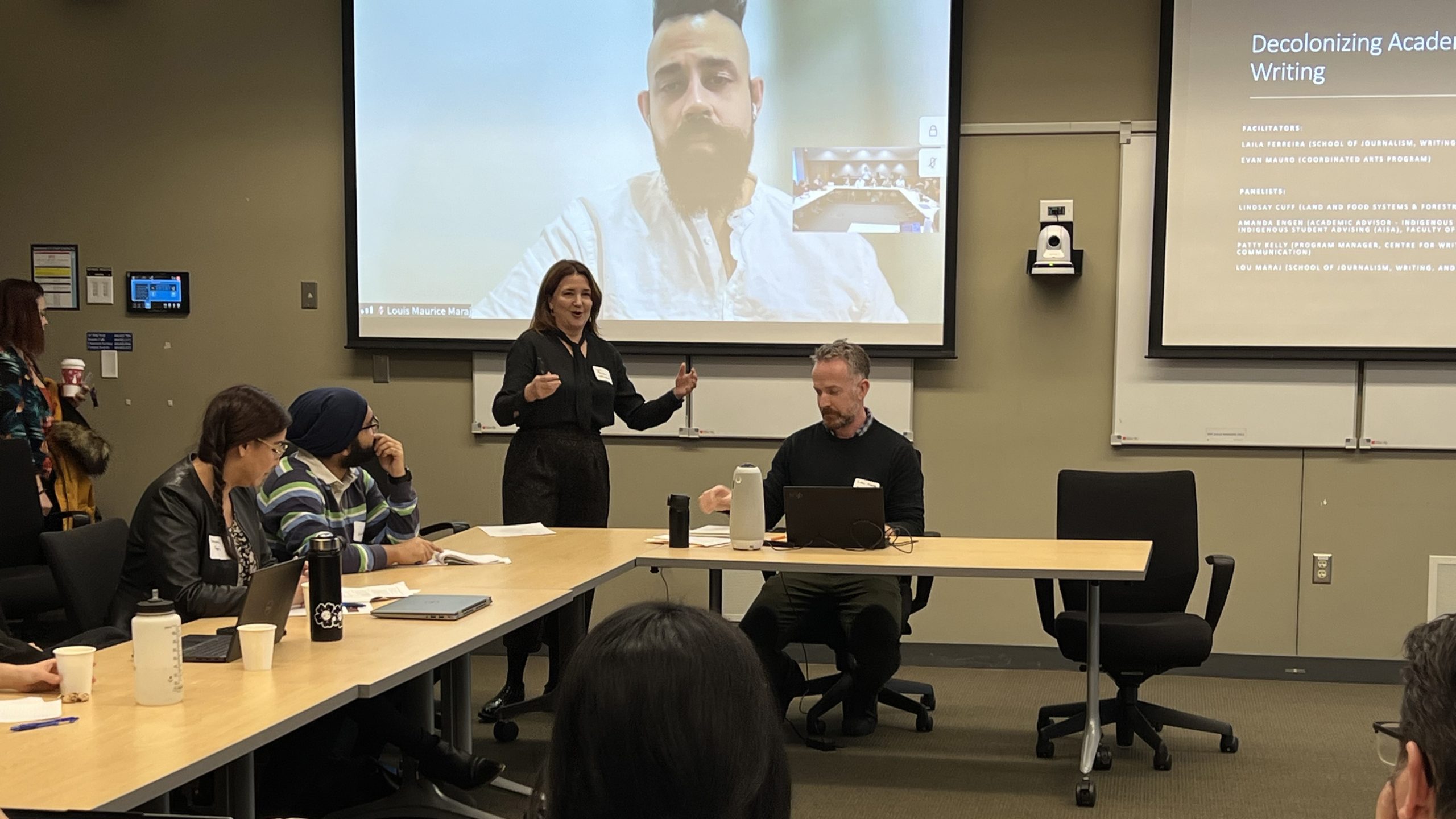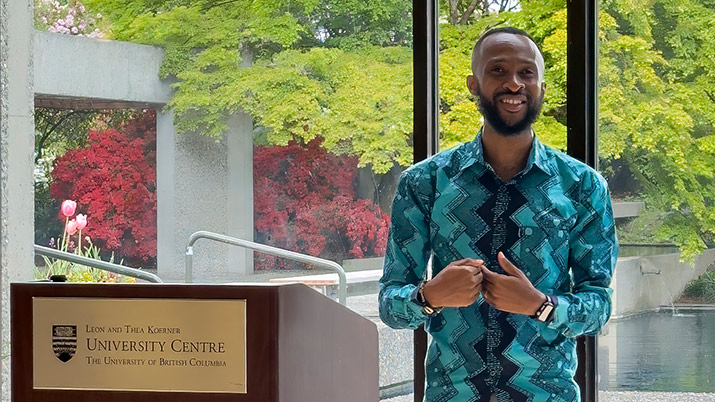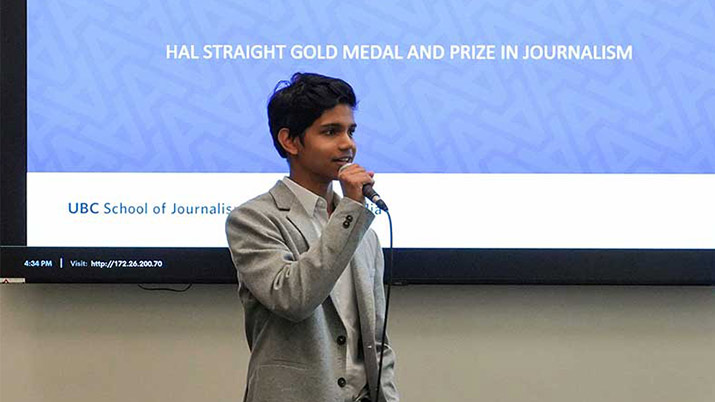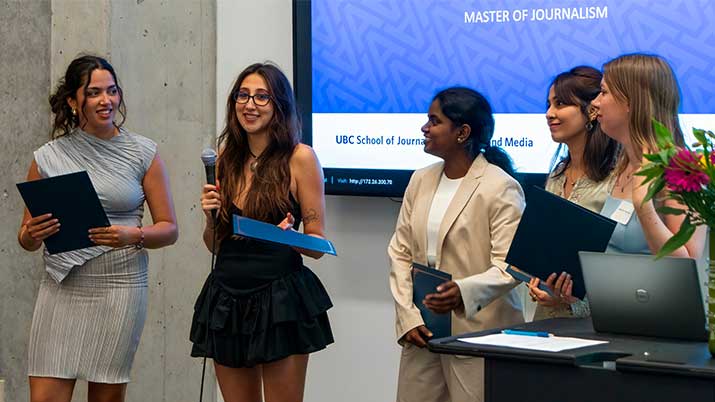For faculty members in the School of Journalism, Writing, and Media (JWAM), decolonizing writing and scholarly communication is much more than just an academic exercise.


Recently, Dr. Laila Ferreira, Assistant Professor of Teaching in the Writing, Research and Discourse Studies (WRDS) unit within JWAM, along with Dr. Evan Mauro, Lecturer in the Coordinated Arts Program, brought together faculty, staff, and students from across campus for Decolonizing Academic Writing, an interactive panel discussion on integrating Indigenous knowledge into research and writing practices at UBC. The event, a part of CTLT’s Winter Institute, integrated a variety of perspectives and expertise into the conversation.
“It was a bottom-up way of people thinking about how they can decolonize their end of the university,” said Dr. Mauro. “It’s great to see a session like this where people show up and see this is happening…and can figure out ways to work with it.”
A complex undertaking
By enacting its Indigenous Strategic Plan (2020), UBC committed to achieving eight key goals from the UN’s Declaration on the Rights of Indigenous Peoples and the TRC’s Calls to Action. Indigenizing UBC’s curriculum is one goal in this long process but, according to Dr. Ferreira who has been leading her unit in the endeavour, the university still lacks a cohesive vision of what exactly that means. Faculty members have also noted the diverse needs across varied academic units to bring their decolonization efforts to fruition. Fostering the growth of that shared decolonization conversation is central to realizing UBC’s vision for implementing Indigenous knowledge. By design, the event’s panelists hailed from a variety of units at UBC to offer insights into the varied needs and experiences of their colleagues and students. Featured on the panel were Lou Maraj from JWAM, Lindsey Cuff from Land and Food Systems, Amanda Engen from Indigenous Studies, and Patty Kelly from the Centre for Writing and Scholarly Communication.
“We didn’t have experts here speaking about how you do this. There’s no answer like that,” said Dr. Ferreira. “We had people sharing their experiences, their knowledge with one another and sharing possible ways forward that we might take up.”
“What does that (decolonization) look like for students who are going out into the job market who are being told they need to publish in journals that are not yet on board with decolonizing?”
Making an impact
For Drs. Mauro and Ferreira, decolonization must go beyond panel discussions featuring academics. The effort requires a holistic approach to teaching and learning that incorporates all voices at UBC. “What does that look like for students who are going out into the job market who are being told they need to publish in journals that are not yet on board with decolonizing?” said Dr. Ferreira.
That effort to incorporate student voices into the decolonization effort is showing some early returns. According to Dr. Mauro, students are becoming increasingly eager to steer their own educational journeys away from traditional norms. “We would worry about any top-down edicts about ‘this is curriculum’ being imposed on our classrooms,” said Dr. Mauro. “But it’s coming from the interactions that we’re having with students and the needs that they have to bend the institution to what they want to write. We’re seeing that in our classrooms.”
What’s more, decolonizing writing at UBC is extending beyond individual classrooms and into the professional world. “We heard from an editor of an open-source journal who’s working at publishing writing that doesn’t meet the conventional standards of peer-reviewed work. That’s how we know this work is happening,” said Dr. Mauro. “People are critiquing the existing academic writing conventions and the way they present a colonial mode of knowing. It’s a bit like trying to turn a tanker mid-channel. But every degree of turn, every small project is helpful.”
Looking ahead
In the future, the pair plans to continually decolonize writing at UBC through ongoing conversations within academic units, more panel events featuring like-minded individuals, and symposia that bring together larger groups of people dedicated to addressing the issue. These initiatives complement an array of WRDS courses that are already working to address systemic academic issues. One of which, WRDS 370: Research Writing and Marginalization, investigates research discourse to consider how Indigenous people are positioned within research writing.


